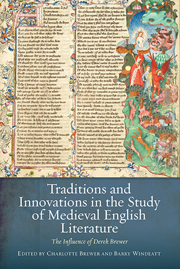 Traditions and Innovations in the Study of Medieval English Literature
Traditions and Innovations in the Study of Medieval English Literature Book contents
- Frontmatter
- Contents
- List of Contributors
- Acknowledgements
- Note on References
- Introduction: A Modern Medievalist's Career
- 1 Derek Brewer: Chaucerian Studies 1953–78
- 2 Brewer's Chaucer and the Knightly Virtues
- 3 Class Distinction and the French of England
- 4 Time in Troilus and Criseyde
- 5 Virtue, Intention and the Mind's Eye in Troilus and Criseyde
- 6 Falling in Love in the Middle Ages
- 7 The Idea of Feminine Beauty in Troilus and Criseyde, or Criseyde's Eyebrow
- 8 ‘Greater Love Hath No Man’: Friendship in Medieval English Romance
- 9 Gowerian Laughter
- 10 Derek Brewer's Romance
- 11 Malory and Late Medieval Arthurian Cycles
- 12 The Ends of Storytelling
- 13 Manuscripts, Facsimiles, Approaches to Editing
- 14 Words and Dictionaries: OED, MED and Chaucer
- 15 Afterlives: The Fabulous History of Venus
- Afterword: Derek Brewer: with ful deuout corage
- Bibliography
- Index
- Tabula in Memoriam
15 - Afterlives: The Fabulous History of Venus
Published online by Cambridge University Press: 05 September 2013
- Frontmatter
- Contents
- List of Contributors
- Acknowledgements
- Note on References
- Introduction: A Modern Medievalist's Career
- 1 Derek Brewer: Chaucerian Studies 1953–78
- 2 Brewer's Chaucer and the Knightly Virtues
- 3 Class Distinction and the French of England
- 4 Time in Troilus and Criseyde
- 5 Virtue, Intention and the Mind's Eye in Troilus and Criseyde
- 6 Falling in Love in the Middle Ages
- 7 The Idea of Feminine Beauty in Troilus and Criseyde, or Criseyde's Eyebrow
- 8 ‘Greater Love Hath No Man’: Friendship in Medieval English Romance
- 9 Gowerian Laughter
- 10 Derek Brewer's Romance
- 11 Malory and Late Medieval Arthurian Cycles
- 12 The Ends of Storytelling
- 13 Manuscripts, Facsimiles, Approaches to Editing
- 14 Words and Dictionaries: OED, MED and Chaucer
- 15 Afterlives: The Fabulous History of Venus
- Afterword: Derek Brewer: with ful deuout corage
- Bibliography
- Index
- Tabula in Memoriam
Summary
You rise up from the fecund infinite seas
Engendered from the bloody sperm of male
Desires; yet less than masculine, more strong
In quintessential female power one could
Not think nor hope …
(‘Another Epiphany’, Brewer 2000a: 5)‘Medieval writers found Venus a goddess and left her a personification’ (Brewer 1960b: 30), and the history of Venus throughout the Middle Ages and long afterwards, from the mythographers to the Romantics, was just one aspect of the larger fascination with literary inheritance and influence that led Derek Brewer to foundational work on the reception of Chaucer from 1400 to the present. It was Chaucer's Venuses that prompted Brewer's interest both in their antecedents and in their successors in the Renaissance and thereafter (Brewer 1992, 1995, 2002b, 2006b). The present essay revisits the fabulous history of Venus, exploring fifteenth-century afterlives of Venus in the light of Chaucer's key changes to his sources for the Venuses in his poems. Boccaccio's description of the temple of Venus in his Teseida (Limentani 1964: 7. 50–69) is the single source for Chaucer's two accounts of Venus in The Parliament of Fowls and ‘The Knight's Tale. Chaucer's reworkings of this source, his significant additions and omissions, along with the theme of Venus more largely in ‘The Knight's Tale’ and Troilus, will provide models for the Venus of Chaucer's successors.
- Type
- Chapter
- Information
- Traditions and Innovations in the Study of Medieval English LiteratureThe Influence of Derek Brewer, pp. 262 - 278Publisher: Boydell & BrewerPrint publication year: 2013


